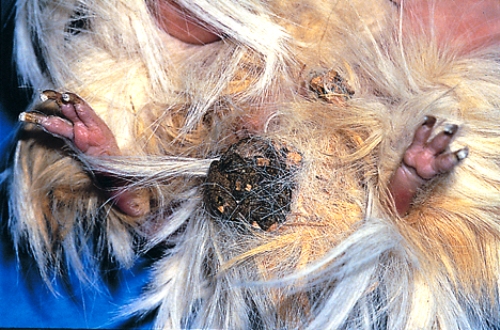Difference between revisions of "Small Mammals Q&A 01"
(Created page with "<br style="clear:both;" /> {| align="left" width="100%" style="background-color:#04B4AE" |- | align="center" | 90px|Mansonlogo | align="left" | This ques...") |
|||
| (3 intermediate revisions by 2 users not shown) | |||
| Line 3: | Line 3: | ||
|- | |- | ||
| align="center" | [[File:Manson_logo.gif|90px|Mansonlogo]] | | align="center" | [[File:Manson_logo.gif|90px|Mansonlogo]] | ||
| − | | align="left" | This question was provided by [[:Category:Manson|Manson Publishing]] as part of the [[OVAL Project]]. See more [[Category: Small Mammals Q&A|Small Mammals questions]] | + | | align="left" | This question was provided by [[:Category:Manson|Manson Publishing]] as part of the [[OVAL Project]]. See more [[:Category: Small Mammals Q&A|Small Mammals questions]] |
|} | |} | ||
<br><br><br> | <br><br><br> | ||
| Line 17: | Line 17: | ||
|a1= Faeces have soiled the perineal area. | |a1= Faeces have soiled the perineal area. | ||
Other causes of strong body odor in the guinea pig include perineal soiling due to urinary tract or uterine disease, soiling of fur around the mouth due to dental disease, smegma in the perineal sac (which occurs in both male and female) and infections or neoplasia of the perianal sebaceous glands. | Other causes of strong body odor in the guinea pig include perineal soiling due to urinary tract or uterine disease, soiling of fur around the mouth due to dental disease, smegma in the perineal sac (which occurs in both male and female) and infections or neoplasia of the perianal sebaceous glands. | ||
| − | |l1= | + | |l1=Antibiotic-Associated Dysbacteriosis |
|q2= What is the cause of the soft stools? | |q2= What is the cause of the soft stools? | ||
|a2= | |a2= | ||
| Line 25: | Line 25: | ||
*Remember antibiotics to be avoided by the ‘PLACE’ rule (penicillin, lincomycin, ampicillin, amoxicillin, cephalosporins, clindamycin, erythromycin). | *Remember antibiotics to be avoided by the ‘PLACE’ rule (penicillin, lincomycin, ampicillin, amoxicillin, cephalosporins, clindamycin, erythromycin). | ||
*Sulfa-trimethoprim combinations, enrofloxacin and chloramphenicol are rarely associated with GI disturbance in guinea pigs. | *Sulfa-trimethoprim combinations, enrofloxacin and chloramphenicol are rarely associated with GI disturbance in guinea pigs. | ||
| − | |l2= | + | |l2=Antibiotic-Associated Dysbacteriosis |
</FlashCard> | </FlashCard> | ||
{{#tag:imagemap|Image:Next Question.png{{!}}center{{!}}200px | {{#tag:imagemap|Image:Next Question.png{{!}}center{{!}}200px | ||
| − | rect 0 0 860 850 [[Small Mammals Q&A | + | rect 0 0 860 850 [[Small Mammals Q&A 02|Next question]] |
desc none}} | desc none}} | ||
[[Category: Small Mammals Q&A]] | [[Category: Small Mammals Q&A]] | ||
Latest revision as of 12:44, 16 August 2011
| This question was provided by Manson Publishing as part of the OVAL Project. See more Small Mammals questions |
A three-year-old female guinea pig has had an unpleasant body odor for three days. Six days ago the owner took the guinea pig to another veterinarian to have her feet examined because the plantar surfaces were reddened. The veterinarian diagnosed pododermatitis. The owner was instructed to take the guinea pig off wire flooring and place it on shredded paper. The veterinarian also prescribed oral amoxicillin with clavulinic acid to treat the infection. The feces in the carrier have a thick-liquid consistency. The guinea pig is still eating and drinking.
| Question | Answer | Article | |
| What is the source of the odour? | Faeces have soiled the perineal area.
Other causes of strong body odor in the guinea pig include perineal soiling due to urinary tract or uterine disease, soiling of fur around the mouth due to dental disease, smegma in the perineal sac (which occurs in both male and female) and infections or neoplasia of the perianal sebaceous glands. |
Link to Article | |
| What is the cause of the soft stools? |
|
Link to Article | |
